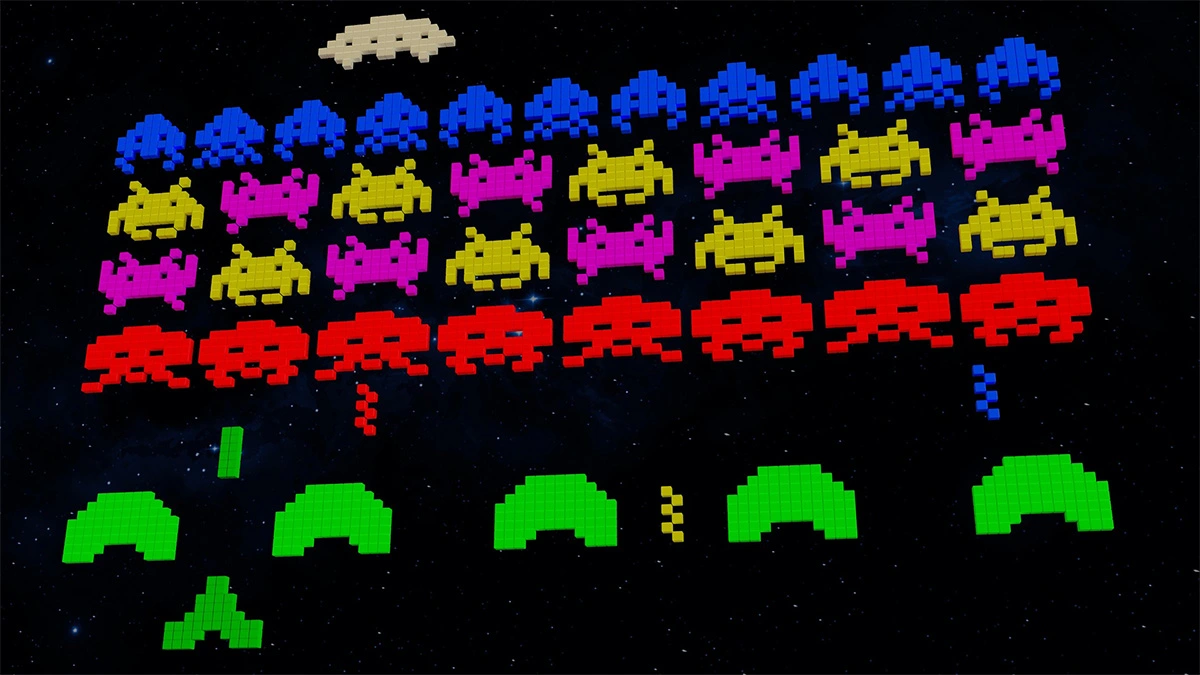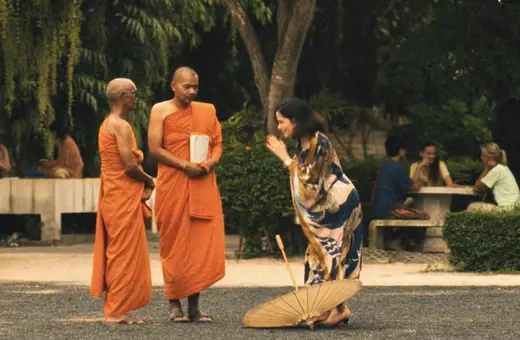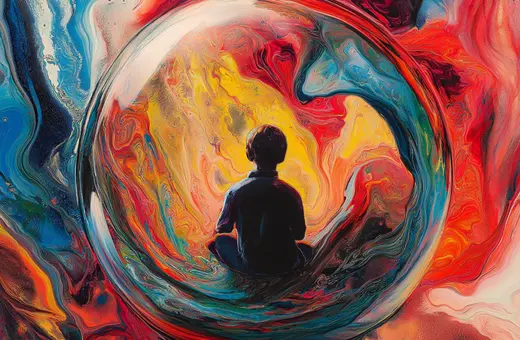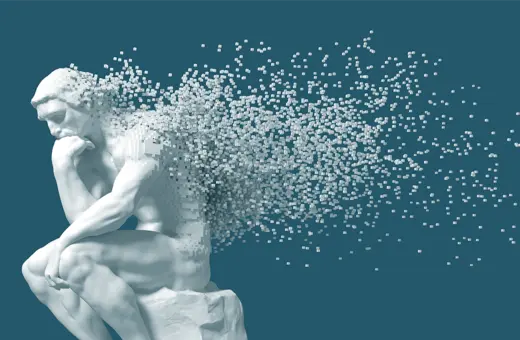At the HowTheLightGetsIn festival earlier this year, Slavoj Žižek, Steven Bonnell (aka Destiny) and Lisa Miller met to debate ‘The Game of Life’. Hosted by Myriam François. The philosopher, the YouTuber and the spiritual psychologist traversed the increasing gamification of reality, and what it might mean for capitalism, virtual reality, and the meaning of life. Ricky Williamson explores the debate, Apple Vision Pro, Nietzsche, and consciousness, and offers a perspective to help you win at the game of life. Watch the debate this article is about here.
Apple has entered the AR/VR game. The new Apple Vision Pro allows the wearer to enter into a half-virtual, half-physical world. The virtual and the real are blurring and becoming one.
We already spend half our lives staring at our phones. But what if our phones were literally taped to our eyeballs? This is effectively the vision of Apple, Meta, and other tech companies. It appears ‘the current thing’ has gone full circle, from VR to AI, and now back to VR/AR. Forget the singularity, two letter acronyms are taking over the world!
As the metaverse is reborn into relevancy, the potential negatives of a VR future lie before us. Firstly, if you are in a virtual or augmented world, you might miss what is beautiful about this one. Sure, David Chalmers argues the virtual and the real are one and the same reality, and we can see his point; when you put on Apple Vision Pro you don’t actually ‘go anywhere’. However, a walk in a real-life park is full of the unmatchable beauty of real trees, and the un-replicable smell of real grass and, most importantly, it is not at the whim of tech companies vying for your attention. During a walk in a virtual park your eyes are being constantly tracked and the data sold to everyone from virtual property developers to dog ice-cream manufacturers. And in this virtual reality nature’s wonders could be interrupted at any moment by a WhatsApp notification from a friend telling you they’ve bought a virtual pet hamster and named her Dorothy. Did you know you can buy virtual property and live, virtually, next to Snoop Dogg?! God, I feel like I’ve gone back in time to peak metaverse and crypto-mania. I miss AI already.
SUGGESTED VIEWING The game of life With Slavoj Žižek, Steven Bonnell, Lisa Miller, Myriam François
___
It was hard to gamify romance in the 14th century, but Tinder managed it pretty easily in the 21st century. Tinder turned love into a game of snap – with each ‘match’ causing an addictive dopamine rush
___
Another concern around the digitalisation of everything, is the fear that life is being turned into a game. Ready Player One is a film about this very idea. However, gamification has been around even before digitalisation. In one way, the system of money is gamification – a way of ‘keeping score’. Democratic politics is also gamified, the party or person with the most votes ‘wins’; there’s a red team versus a blue team. But, as digital technologies become more embedded in our lives, gamification will become even more prevalent. It was hard to gamify romance in the 14th century, but Tinder managed it pretty easily in the 21st century. Tinder turned love into a game of snap – with each ‘match’ causing an addictive dopamine rush. Many have become addicted to Duolingo, my own mother included. Duolingo turned learning a language into a game with high scores, leader boards and streaks. While my own personal addiction is Twitter; the drag down slot machine for the information age. Digitalisation makes gamification much easier. So, the more digital our lives become, the more easily manipulated by games and gamification we are.
And these companies aren’t gamifying our lives in order to make our lives more fun. If this is a by-product of their action, then great – I’m not sure most companies actively want to be evil. But their primary motivation for gamifying our reality’s is not our enjoyment, it is to monetize our behaviour, our data and make us addicted to their product. Often these products monetize features that will help you ‘win’ at their game; so the more they make us want to win, the more likely we are to give these companies our money. And due to Moloch style game theory dynamics – recently brought to popular attention by Liv Boeree and Max Tegmark, both upcoming guests at IAI events – every company these days has no choice but to partake in addict-creating gamification tactics, or else they will fall prey to their competitors who do gamify. It’s a Mario Kart inspired race to the bottom. Watch out for the banana skins.
 SUGGESTED READING
Life is a squid game
By Edward Castronova
SUGGESTED READING
Life is a squid game
By Edward Castronova
At this year’s HowTheLightGetsIn festival in Hay, one-of-a-kind philosopher Slavoj Žižek, YouTuber Steven Bonnell (Destiny), and spiritualist psychologist Lisa Miller debated ‘The Game of Life’. All hosted by journalist, filmmaker and presenter, Myriam François. “Games are everywhere”, the introduction to the debate read, “but critics argue games distort life and empty it of meaning. And games can be dangerous. QAnon was created initially as an alternative reality game, and on January 6th, 2021, the storming of the US Capitol saw this game come to life with terrifying consequences.”
The table was set, the game booted up, the key questions that Žižek and the other panellists were to try to answer went as follows, “Do we need to eradicate the relentless gamification of life? Should we recognise life has no clear goal, no way to win, no level-ups, no measures of success, no extra lives, respawns, or second chances? Should we see games as furthering inequality - creating winners and losers? Or have games always been with us, from the system of money to the blue vs red of politics, to the hierarchies of education, and is harnessing their power a step forward, not a step back?”
___
“I am all for gamification. Good and evil, I don’t care, give me more of it!”
___
In response to these questions, the speakers came from very different angles. Lisa Miller argued for a spiritually minded brain – something akin to Iain McGilchrist’s right brain hemisphere – which has been overrun by McGilchrist’s left brain that’s focus is on manipulating the world. She argued gamesmanship and competition in our modern hyper-capitalistic culture have taken precedence over awareness and love to a detrimental degree.
Steven Bonnell, known as ‘Destiny’ - a YouTuber and former professional video-game player - argued life definitely is a game, and we must do our best to set the rules up well and play them the best we can. Though he argues that the way the societal game is set-up now is rigged and leading to a gamified disaster, in which the players awarded the highest scores are the ones that are destroying the world the fastest. “We need to find better ways of playing the game of our lives, so that we reach a deeper sense of fulfilment. So we’re not just chasing the dragon of consumerist success.”
Onto Žižek. In his famous attention-grabbing style, Žižek argued we all have the unconscious belief that we really would respawn if we died. Žižek argued, “it’s part of humanity’s symbolic order, we dwell in, something that I cannot but call, ‘undeadness’. Undeadness in the sense that you act as if you can do it again… we act as if we can go back to a zero-point and start again.” We believe if we wanted, we could always just try again. If we die, or fail at anything, or we end a relationship; we think we can just start again from the same ‘zero-point’ from which we began. Obviously, this is not really the case. If a 10-year relationship ends at the age of 35, you don’t wake up the next day being 25, ready to try to find love again. A person that fails at something does not start again back at the place from which they began. As for death, I doubt the dying person gets to respawn at a life checkpoint of their choice, ready to try all over again.
This unconscious belief that Žižek is arguing for - an ability to always start again – sounds a little like a recipe for taking everything for granted, which is surely one of the things the human condition is characterised by. In the words of Camus, “after a while you could get used to anything.” Before the smartphone, we couldn’t imagine the smartphone. A computer, a camera, an MP3 player in your pocket; what a wondrous thing it would be! Then we had a smartphone for a week and we were all already bored of them. Now we’re all addicted to them and loath ourselves for that addiction. Once we all have Apple Vision Pro VR headsets, give it a week, and we’ll all be used to that too. A frightening prospect perhaps. But if we do turn society into a Wall-E style VR dystopia - we should not assume that we will be able to just press a button, and simply try again.
Žižek went on, “I am all for gamification. Good and evil, I don’t care, give me more of it!” This sounds slightly like a Nietzschian call for aesthetics for their own sake. A call for a world beyond good and evil, a world that is a game that’s sole purpose is the experience of playing it. A call for getting into Nozick’s experience machine, a virtual paradise that we prefer to a mundane reality. Would you rather stay in the Matrix and eat steak and drink red wine, like the character Cypher, or do you want to only eat gruel in the real-world? Is ignorance bliss? Or should we desire truth at the sacrifice of all else? Should we put on the VR goggles and never take them off? Have we already done so?
___
“Games enable you to take catastrophe in a non-serious way. Maybe, just maybe, this is the way to do it.”
___
For all we know, we entered a VR machine long ago, one that gives its user amnesia, one that can provide virtual thoughts and feelings, bodily sensations, a whole virtual life, as well as sound and sight. Maybe life and the reality we experience every day already really is a game. Rick and Morty have an episode like this. As part of a game at an arcade, Morty lives an entire life inside a VR machine. He lives an entire life as a person named Roy; from wetting the bed as a child, to playing college football, to being diagnosed with terminal cancer. Once he dies, he emerges from the VR machine, the existential shock hits hard once he realises he’s no longer Roy, he’s Morty again.
This is not as crazy as it sounds. Something like this really may have happened metaphysically. Suppose for a second consciousness does not emerge from a particular complex arrangement of brain chemistry – an idea that many philosophers are now starting to reject. Suppose the brain is more like a radio receiver of a collective consciousness instead – a universal mind which enters into individual bodies and becomes immersed in the ‘virtual reality’ of being an individual person.
Schrödinger, the father of quantum mechanics, thought this was the true structure of consciousness in the universe. Ancient Indian philosophy pointed to this being the structure of reality some time ago in the Upanishads. Those that’ve experienced high doses of psychedelics often report a universe set-up much like this delineation of consciousness. Donald Hoffman and his colleagues have recently argued for a version of universal-individual consciousness much like this as well. So, one might see that we are this universal consciousness, playing the game of individuality. When we, the individual, dies, we’ll be reunited with that universal consciousness. We might then ‘respawn’ into another life – aka reincarnation. An idealist or a panpsychist – rather than a materialist – explanation for consciousness leaves a great deal of room for life to be something like a game then. A game the universal mind plays for a while: the game of individuality.
As part of the debate at HowTheLightGetsIn, Steven Bonnell (Destiny) argued it is very important the type of games we play. We only want to play certain games. Games with particular rules, with particular goals, with particular aesthetics. If life metaphysically really is something akin to a game, we may ask: what makes the game of life worth playing? Some of those Ancient Indian philosophers argued that the universal mind is ‘being, consciousness, bliss’. Bliss. Many mystics within other traditions, and those outside all traditions, also argue that the universal consciousness is in a state of bliss. If this is the case, why would this blissful universal consciousness enter into space-time, and play this game of individuality, which contains the great deal of suffering that it does? Why leave heaven to play a game on earth? (This is somewhat akin to the famous problem of evil).
Žižek wrapped up the HowTheLightGetsIn festival debate by offering a thought that could act as an answer to this query. He returned to his proposed Nietzschian life-ethic of an aestheticism beyond good and evil. He argued, “games enable you to take catastrophe in a non-serious way. Maybe, just maybe, this is the way to do it.” By ‘it’ we can assume he meant something like winning at the game of life. Where winning is not setting a high score, or defeating some final boss, but where winning means to play the game in the right way. With a quality of sportsmanship, originality, and grace. By gamifying life, maybe we could hold onto it a little looser.
Tangentially to Žižek, I will answer this problem of the suffering of life with an aphorism. (I wish people wrote in aphorisms more. They are fun. Easy to read; even for the laziest of readers. They allow the reader to fill in the gaps of the thought of the writer, to wonder about the aphorism’s origins and meaning, and to go somewhere new and original with it.) If life indeed is a game, then it turns out there is a clear reason for the presence of suffering within it. For, if both football teams knew for sure who was going to win the match before beginning, neither team would bother putting on their boots. If the chess grandmasters knew the result before moving the first piece, they would simply shake hands and walk away from the table. Challenge, difficulty, an unsure outcome, pain, suffering, death… all aspects of the game of life. Why would a blissful, universal consciousness choose to play a game which contained such things?
The reason for suffering: If you know you’re going to win the game, what’s the point in playing it?






















Join the conversation